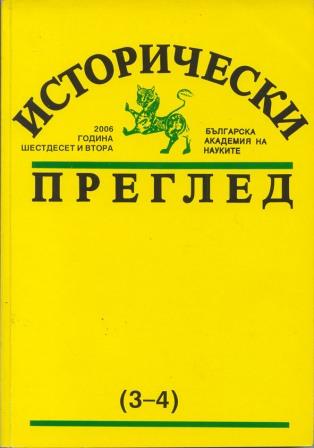Вътрешната революционна организация в Българско през 1876 г. - задачи и послания
The Internal Revolutionary Organisation in Bulgarian Lands — Tasks and Messages in 1876
Author(s): Ognyana Mazhdrakova-ChavdarovaSubject(s): History
Published by: Институт за исторически изследвания - Българска академия на науките
Summary/Abstract: The main tasks in the preparation of the Uprising of April 1876 were entrusted to the structures of the Internal Revolutionary Organisation (IRO), according to the plan of its initiators. The network of secret committees, which Vassil Levski and his collaborators had set up, was extended by their followers in 1876. Having been put to the test, the network managed to live up to hopes and to become the major tool for mobilizing the sympathizers of the idea for the liberation of the motherland from Ottoman rule. The potential of the IRO was revealed in the successful propaganda and the readiness among the vast population to make material sacrifice. The article gives an account of the various ways of raising funds for the supply of modern weapons, uniforms, food, etc. The emigration was initially excluded from the preparations, which raised the responsibility of the apostles for the military-technical supply of the uprising. The author gives support to the suggestion that in spite of the poverty and the conditions of conspiracy substantial though insufficient funds were raised in the four districts, exclusively from internal sources. Some evidence in the foreign press revealed that fact in contradiction of ill-intentioned rumours that there had been foreign intervention, i.e. Russian and Serbian emissaries and funds. The author focuses on another important advantage of the apostles-organizers of the Uprising of April, i.e. the continuity between them and the achievements of the Bulgarian liberation movement before them. For example, from the ideological programme of the Bulgarian Revolutionary Central Committee they adopted the basic principle to fight only against armed forces, to have respect for the honour, life and property of peaceful Muslims in the course of the uprising. That postulate had been set forth by Rakovski, Levski and Karavelov. The accounts of reliable witnesses of the events, who were interested in the democratic views and in the programme claims of the Bulgarian leaders, are also quoted in support of the flawlessly respectful attitude of the Bulgarian rebels towards the enemy and their sacrifice in the unequal struggle. The political effect of the Uprising of April was enhanced by the European press, where those facts were revealed. An Austrian political journalist, who wrote with astonishment about the pro-European ambitions of the Bulgarian leaders of the uprising, is given as an example. The revolutionary co-workers in the motherland had to face new tasks in the critical months for the Bulgarian nation following the defeat of the uprising. The author gives evidence against the thesis that the activity of the Internal Revolutionary Organisation ultimately ceased after May 1876. Local committees and separate groups of co-workers survived despite the danger of arrests and death by hanging...
Journal: Исторически преглед
- Issue Year: 2006
- Issue No: 3-4
- Page Range: 182-200
- Page Count: 19
- Language: Bulgarian
- Content File-PDF

